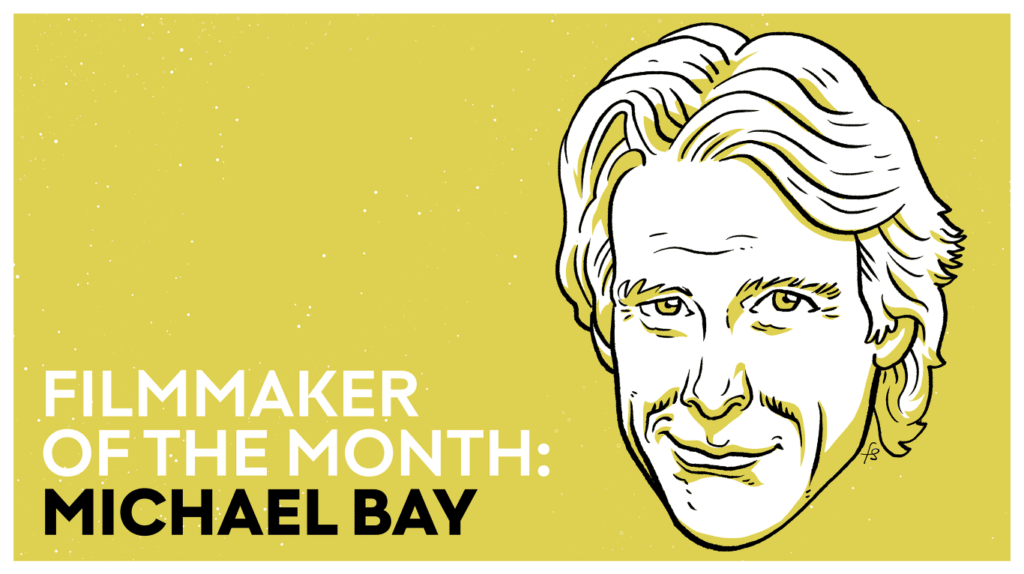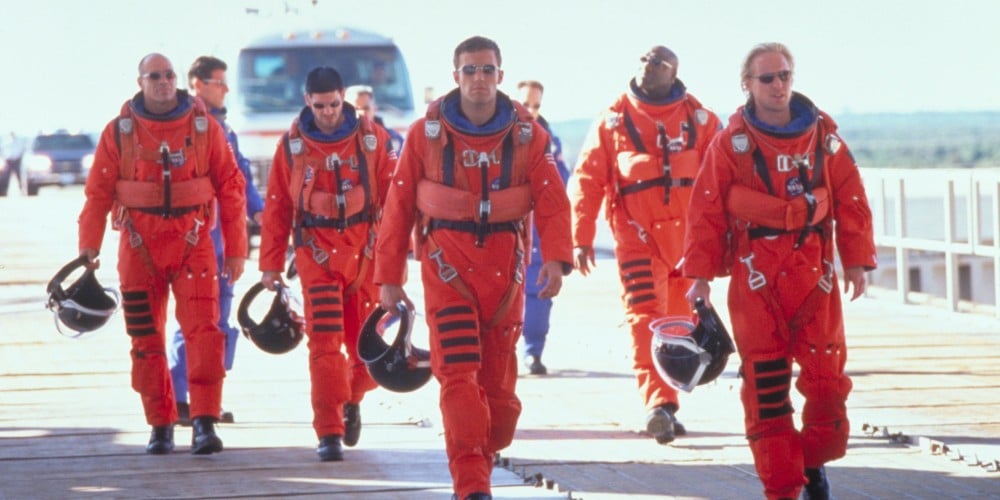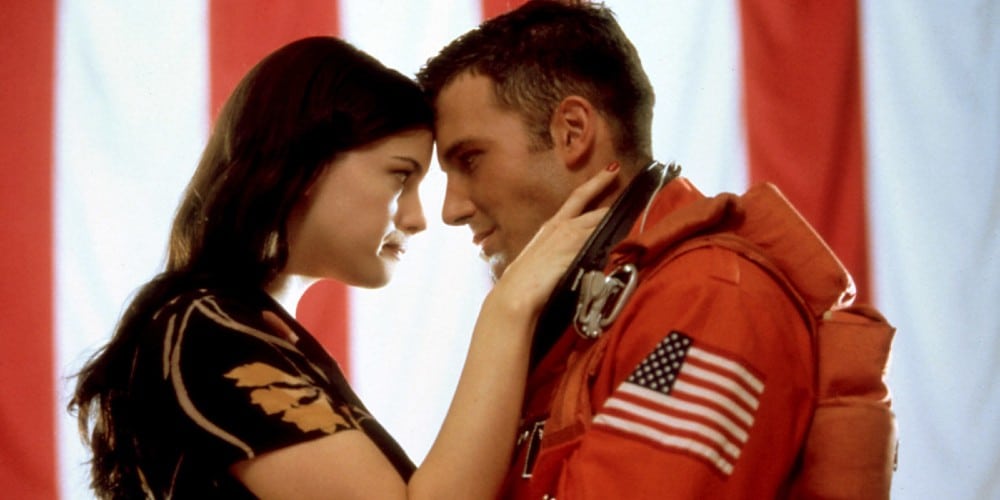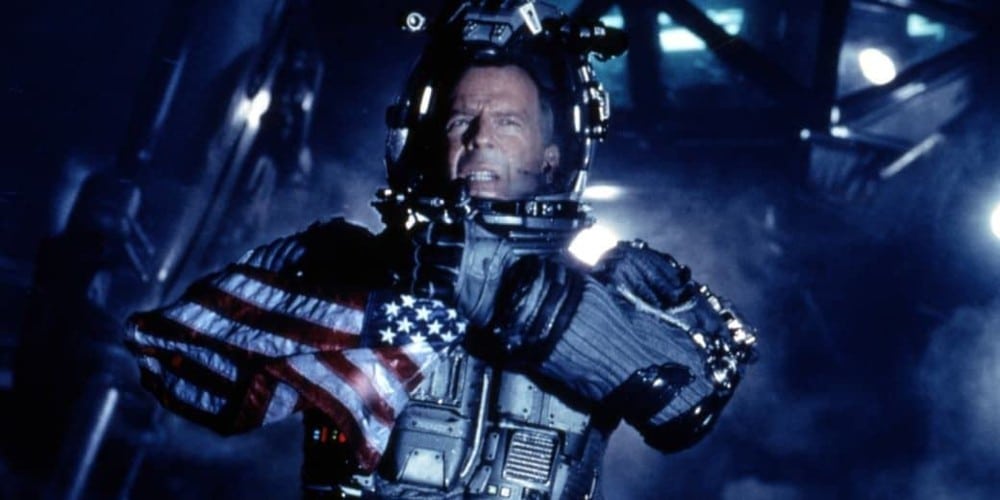Bay’s style reaches an apex in his humanity v. asteroid flick, which changed his reception forever.

Armageddon was never just a movie. Beginning with its much-coveted Fourth of July Weekend opening, to its (now typically) Bayhem-infused Super Bowl commercial, through its screening of fifty minutes at Cannes and bizarre feud with Roland Emmerich’s Godzilla (literalized in the film) over which movie would be the biggest of summer 1998, Armageddon positioned itself as nothing less than a pop-cultural event. It was the most expensive movie Disney had ever produced, starred Bruce Willis in his prime, backed him with a suddenly white-hot Ben Affleck, and was directed by blockbuster wunderkind Michael Bay. Add to all that the escalating success of 1997’s Lost World, Men in Black, and Titanic, and there was the sense that this would be a movie for the ages. Which it was. Kind of.
It seems there’s an asteroid the size of Texas hurtling through the solar system on a collision course with Earth. Bruce Willis is Harry Stamper; the best deep-sea oil driller there ever was. NASA nerd Dan Truman (Billy Bob Thornton) recruits Harry and his team to fly into space, land on the asteroid, drill to its core and deposit a nuclear warhead intended to destroy the massive rock before it hits the planet. It was a sci-fi Dirty Dozen for the MTV generation, the story of a bunch of blue-collar, ne’er-do-well knuckleheads who team up with the NASA eggheads and save the whole darn world. Armageddon had everything: it had chills, spills, and ‘splosions galore. It had laughs, a few tears, and a hint of romance. And at the end of the day, it was just a story about a father doing all he could to keep his daughter safe.

It’s also textbook Michael Bay – long, and loud, chopped into microscopic pieces and barely coherent. Bay has a habit of mixing somber old-school melodrama with loud, outrageous comedy, military fetishism, and kinetic violence into stories, all shot in deeply romantic cinematic textures. The characters in his stories are usually written and played very broadly, in ways that can hit satisfying archetypal notes, but just as often slide into offensive caricature. It’s a style that the culture has adapted to (for better or worse) in the decades since, but in 1998 it was still pretty new and buddy, not everyone was on board. The Cannes audience heckled it and both Roger Ebert and Rolling Stone went on to say it was the worst movie of the year. There was an article in Entertainment Weekly (a significantly more reputable mag in 1998) asking if Michael Bay was the Devil. The anger and anxiety over Bay and Armageddon achieved a hyperbolic intensity all its own.
It makes sense. Armageddon is a movie of extremes. It’s the “Hot for Teacher” of cinema – blistering technique, and talent in the service of a narrative that can charitably be described as juvenile and nonsensical. Nine writers worked on the script, including Robert Towne and J.J. Abrams. Ben Affleck is on record gleefully poking holes in the movie’s logic on its legendary commentary track. That, by the way, is the Criterion commentary track, the first time they ever released a two-disc DVD set. Because nothing around Armageddon could ever be regular-sized.
How seriously it should be taken is anyone’s guess. There’s a sweet scene where Affleck is about to board the shuttle and he stops to serenade Liv Tyler’s Grace (his fiancé) with “Leaving on a Jet Plane” and all the other driller/astronauts harmonize. But earlier in the movie Willis chased Affleck around the oil rig firing a shotgun at him like a Bugs Bunny cartoon It’s high energy and hums with screw-ball dialogue – a lot of fun but totally at odds with the sentimentality of the serenade scene. Bay fills the movie with montages overflowing with American iconography. Flags are everywhere and there’s more than one wide-angle deep focus magic hour shot of kids running in slow motion holding sparklers while men in work shirts and women in summer dresses stand in front of amber fields of grain and stare into the sky while somber music plays. But up in space a character straddles nuclear warheads and quotes Dr. Strangelove because he has space dementia (which is a thing a person can get apparently) and has gone temporarily insane.

That character is played by Steve Buscemi. His name is Rockhound, Rock because he’s a geological super-genius, and hound because he’s horny all the time. Also, he may be a pedophile? There are certainly jokes about how he likes them young, and he taught Harry’s daughter how tampons worked when she got her first period. So, you know, ha ha. He ends up marrying a stripper he met while on a bender the night before they took off. That’s Rockhound.
And that’s another thing about Armageddon. It has one of those casts that only Jerry Bruckheimer could gather, and that drew film fans’ attention despite their better judgment (see also 1997’s Con Air). Along with Willis, Thornton, Affleck, Buscemi, and Tyler, Bruckheimer and Bay mixed in well-known character actors like Keith David, Udo Kier, and Will Patton with up-and-coming talents like Peter Stormare, Michael Clarke Duncan, William Fichtner, and Owen Wilson. They got Charlton Heston to narrate the opening and the Criterion edition adds a scene where Lawrence Tierney plays Willis’ dad. It’s hard not to care a little bit about what happens to these guys because they’re all so inherently entertaining. But it’s irritating at the same time, because everything that happens is so fucking silly, that casting a bunch of ringers feels like a waste at best and a cheat at worst. Any emotion the movie brings out of you feels unearned and manipulative, like having a cast packed with likable, talented actors is a shortcut to building real characters and situations that an audience can relate to and believe in.
Or maybe that’s what these kinds of movies are supposed to do? Maybe the whole point of these movie roles is to install prebaked types into an expertly crafted ride. The filmmakers can concentrate on making the ride as new and thrilling as they can while trusting the performers to ground it all with their built-in humanity and relatability. Maybe getting annoyed with Armageddon for having thin characters is essentially the same thing as getting annoyed with Out of Sight for not having enough crashes in space.

So is Armageddon good or bad, great, or terrible? The answer is yes. It wanted to be a Great Movie, it really did. It was, to paraphrase the film itself, All-Go-No-Quit-Big-Nuts filmmaking. And it’s one that certainly made a mark. It was part of a phase of environmental disaster movies that flourished for a minute in the 90s. Nobody talks about Twister anymore, or Dante’s Peak, or Volcano—not the way Armageddon is still discussed. Deep Impact was another asteroid (comet, whatever) on a collision course with Earth movie that came out the same year, and it’s a footnote at best. It also ended up being one of the last of its kind. The Phantom Menace came out a year later and was soon followed by Harry Potter, Lord of the Rings, and then the seemingly endless parade of IP and comic movies we live with now. It’s hard to remember when a movie based on an original concept was positioned as the centerpiece of a studio’s entire yearly schedule.
And for a movie with so many writers, with such a famous producer, and such an enormous star, it’s unmistakably the product of its director. Armageddon is as Michael Bay as Michael Bay gets. It’s the total package, before the furious backlash that would paint the rest of this career. Armageddon positioned Bay as the junk cinema auteur of his generation, the go-to example of scorched earth big-budget action cinema for thick-headed adolescent boys and for the thick-headed adolescent boy in us all. After Armageddon, nothing was the same for Bay, or for blockbuster movies. It didn’t mean to be, that’s just kind of how it turned out. Even now, it’s not just a movie.